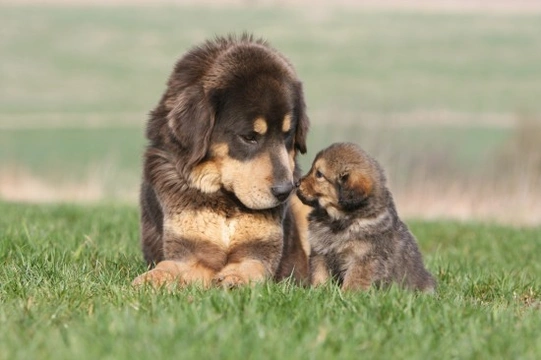
Puppy Development - When does a puppy become an adult dog?
There is no binary figure or calculation that can tell you for certain the age at which your puppy is considered to be an adult dog, or when they will themselves feel like an adult dog, or be viewed as such by other dogs. The development from puppy to adult is not necessarily linear, and it will pass through a range of stages that each individual dog will reach at different points of their lives.
For the purposes of things like buying age-appropriate dog food and getting insurance coverage, dogs are often widely considered to be adult dogs once they turn one year old, but for many dogs, both physical and emotional development will continue until the dog is eighteen months or even two years old. Also, the time that a puppy reaches sexual maturity and is capable of reproducing is often considered to be a pivotal age point, but again, sexual maturity does not mean that any given dog should be considered an adult, and they will almost certainly have a lot of growing and maturing left to do.
Read on to learn more about the stages of puppy development to reach adulthood, and how you can judge when your puppy has become a fully fledged adult dog.
The baby stage
During the first twelve weeks of your puppy’s life, they are growing and developing at the fastest rate, and physical and mental development slows down after this stage. Formative points of the young puppy’s life include gaining their eyesight and hearing, beginning to eat solid foods, moving away from their beds to go to the toilet, and beginning to pick up the very basic rules of etiquette when it comes to their interactions with their dam, littermates and people.
Socialisation and learning about the world
From twelve weeks onwards, your puppy continues to grow physically, but the biggest leap made during this time is the process of socialisation, learning about other dogs and people, and finding out about the wider world. At this age, your puppy should be allowed to socialise with both other puppies and adult dogs as much as possible. Adult dogs, even those that are strangers to your puppy, will be much more forgiving of the young puppy, and give them much more leeway and room for error than they would do for another fully grown dog.
Adult dogs that play and interact with your puppy will begin to teach them valuable life lessons about appropriate play and behaviour with other dogs, who is the boss dog, when to stop playing, and how to read the warning signs and indications that other dogs give out. Play with other puppies and young dogs of a similar age is also an important bonding opportunity for your young dog, and contributes to their social development.
Adolescence and sexual maturity
Just as with teenagers and adolescent humans, reaching sexual maturity is a stage rather than a transition, and one that takes place over a period of time. It would be wrong to assume that once your puppy reaches sexual maturity and is capable of physically reproducing that they are now adults, as they still have a lot of learning to go!
Along with the development of the sex organs, your puppy’s temperament and personality will also be growing, aided by the oestrogen, testosterone or other hormones that are circulating throughout their bodies. This adds an additional angle and stage to the process of reaching maturity, and generally begins at around six months of age.
Size and physical growth
Again, just because your puppy appears to have finished growing or is almost full size, do not assume that this means that they are an adult! The growth to adulthood is not just physical, but also sexual and emotional, and while reaching full size means that your puppy is physically fully grown, they may still have some way left to go!
Different breeds and types of dogs grow physically at different rates, too; small dogs such as the Chihuahua may well be fully grown by around six months of age, while for some giant breeds, they may continue to grow and develop until they are eighteen months old.
Transitioning to adulthood
As puppies go through the final process of the transition to adulthood, they will begin to find that other dogs begin to view them as adults, not puppies, and will begin to treat them as such, giving them less leeway in games and being less tolerant of bad manners. This is one of the final stages of puppy/adolescent development, and one that again provides a steep learning curve for your young dog.
Once your dog is sexually mature (and potentially has been spayed or neutered), physically fully grown, and is emotionally mature and responsive to training and understands that other dogs view them as an adult, they are generally considered to be fully grown. This may happen by one year old, or may take up to two years old for some dog breeds and types.



